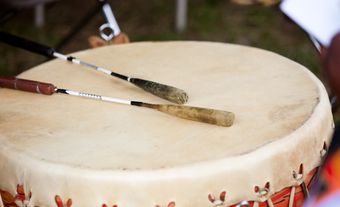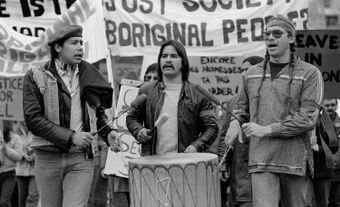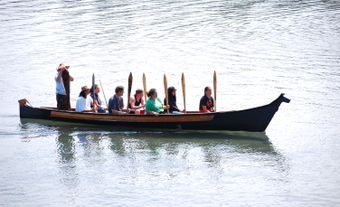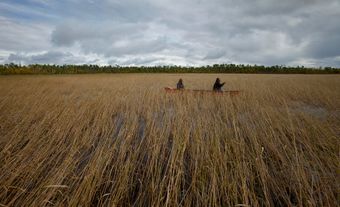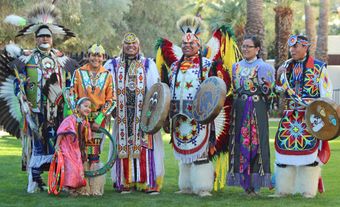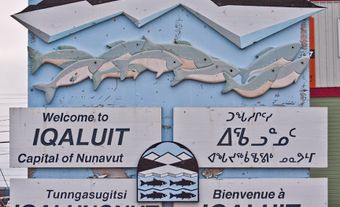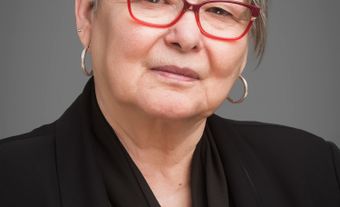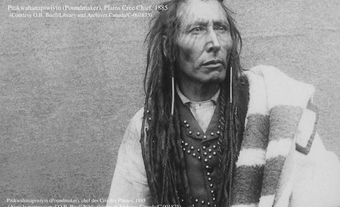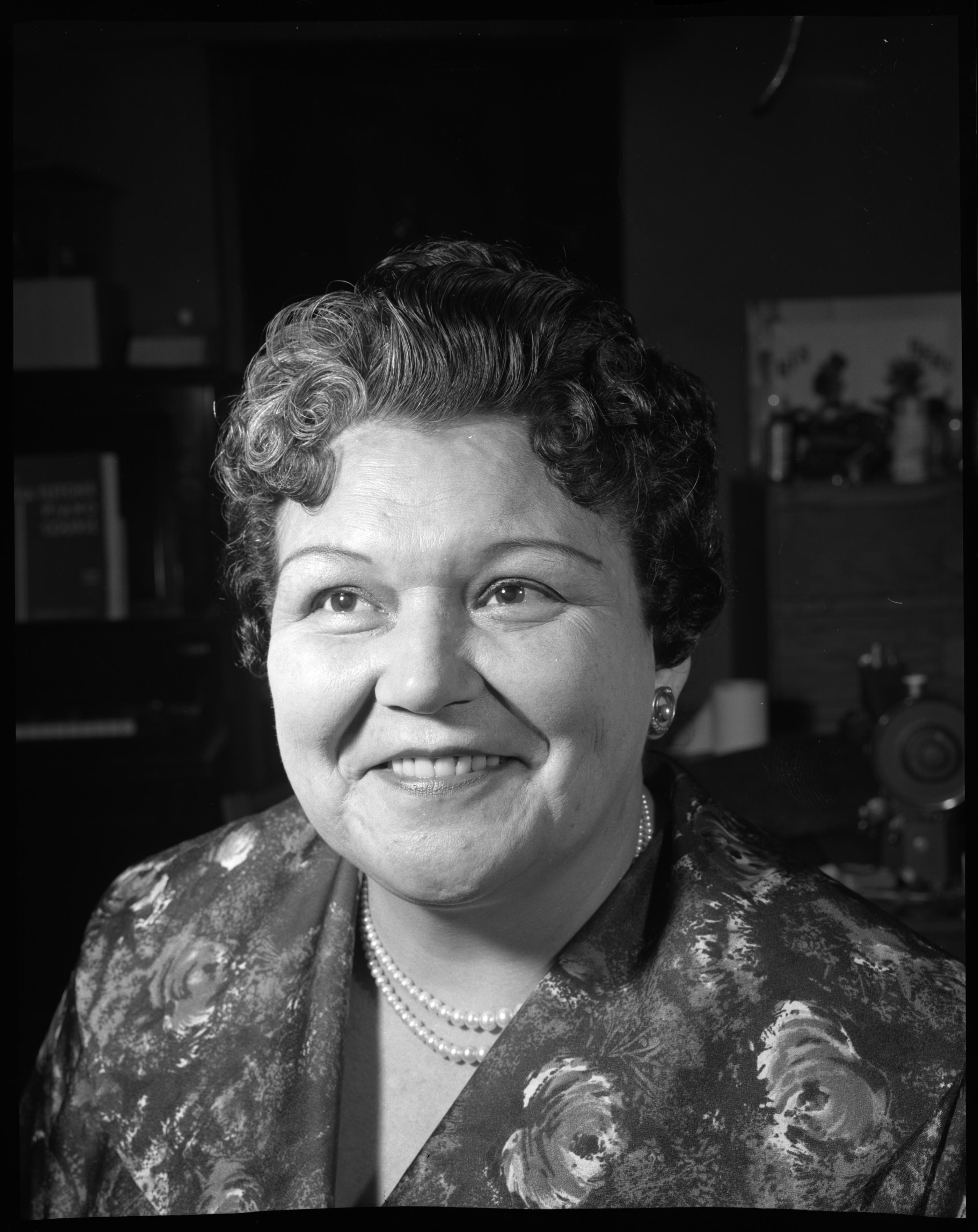
Early Life
English on her father’s side and Squamish on her mother’s, Gertrude Ettershank was born in 1917 on the Mission Reserve (now in North Vancouver), on the north bank of the Fraser River. The traditional territory of the Squamish First Nation is acknowledged as encompassing the lower mainland regions of British Columbia, with their cultural practices and traditions falling under those of the Central Coast Salish (also, see Coast Salish).
After her mother died, Gertrude took care of her younger sister, Vivian, when Gertrude was only 12. Working at a cannery as a teenager, Gertrude met Victor Guerin of the Musqueam First Nation (“People of the River Grass”). In 1936, the young couple married. They had five children whom they raised in North Vancouver.
Career, Activism and Community Work
In 1953–54, Gertrude Guerin and her husband moved their family to his ancestral community. It was there that Guerin became engaged in advocacy work for First Nations people. She went on to be elected chief of the Musqueam in 1959, serving in that position until 1961 (see Coast Salish). Guerin was an active proponent of non-discrimination and equality in the school system, passions that likely stemmed from her experience as a mother and Indigenous person. Because of the long-term effects of European colonization, the 1960s were a time of diminishing economic opportunities for Indigenous people living on reserves. Guerin was active in improving the quality of life for First Nations people, particularly those moving to urban centres (see also Urban Migration of Indigenous People).
In 1967, under the leadership and direction of Ray Collins from the Department of Indian Affairs (see Federal Departments of Indigenous and Northern Affairs), Guerin contributed to the establishment of the Native Education Centre (NEC), now the Native Education College, which sought to support educational pathways and employment opportunities for Vancouver’s growing urban Indigenous population. In 1979, the NEC transitioned to become a private college, and is now operated and controlled by the British Columbia Assembly of First Nations. The organization continues to recognize the contributions of Gertrude Guerin with a Visionary Award in her name, which is given to leaders who have made an impact in the Indigenous community.
Gertrude Guerin was also active in social justice initiatives, where she sought to improve relations between law enforcement and members of Indigenous communities, who faced systemic racism and stereotyping. Guerin was a founding member of the Vancouver Police and Native Liaison Society. In 1963, she also founded the Vancouver Friendship Centre, now the Vancouver Aboriginal Friendship Centre Society, which continues to serve members of the urban Indigenous community by providing health, advocacy, education and social services. This organization has acted as a site of cultural preservation and enrichment ever since it was founded by Guerin (see also Friendship Centres).
This Secret Life of Canada episode explains the history of Friendship Centres, an essential part of urban Indigenous life across the country.
Note: The Secret Life of Canada is hosted and written by Falen Johnson and Leah Simone Bowen and is a CBC original podcast independent of The Canadian Encyclopedia.
Indigenous Rights: R v. Guerin Case
In the early 1980s, Guerin joined with other members of the Musqueam nation to challenge the government on Indigenous rights in a Supreme Court case, R v. Guerin [1984] 2 S.C.R. 335 (also referred to as Guerin v. The Queen). This case stemmed from actions taken by the federal government of Canada in 1958, who represented the Musqueam and leased approximately 162 acres of prime Vancouver land to the Shaughnessy Heights Golf Club. In 1975, the Musqueam filed suit against the federal government for misrepresenting them and their interests. When the case was first heard, the band was awarded $10 million for the government’s failure to provide all details of the agreement to the Musqueam.
The initial ruling was overturned on appeal by the Federal Court of Canada. Named as an appellant in the case, Guerin fought the appeal in 1984. In that year, the Supreme Court of Canada reconsidered the lower court’s ruling, and found that the federal government had breached the terms of the Royal Proclamation of 1763. This document established the relationship between the government and Indigenous people, and outlines that the Crown must behave in accordance with “fiduciary duty,” meaning the Crown must act only in the interests of Indigenous people. The court’s decision established that Aboriginal title (i.e., ownership) was sui generis, or a unique and inalienable (absolute) right.
R v. Guerin is considered a landmark case in Canadian law, and fiduciary duty became central to Section 35 of the Constitution Act, 1982, which enshrines protections for Indigenous rights.
Awards and Honours
In October 2006, Gertrude Guerin was celebrated by the BC government’s Ministry of Community Services and the Ministry of Aboriginal Relations and Reconciliation, and was recognized with a posthumous award that acknowledged her efforts in raising the profile of Indigenous rights, and her tireless work, to empower members of her community.
Legacy
Gertrude Guerin is remembered for her resolve and tenacity. She was a passionate advocate for her community and a strong defender of Indigenous cultural traditions. Her legacy is one that highlights the period from the 1960s to the 1980s as a time of raising awareness of the socioeconomic and political struggles of Indigenous peoples in Canada. Guerin helped to cultivate a celebrated tradition of Indigenous education and activism in British Columbia, and particularly in the Vancouver area, where organizations that she helped to establish and grow continue to thrive and offer essential services to First Nations people.
Her children and grandchildren, such as her son Delbert Guerin (1938-2014) and granddaughter Trudi Harris-Cornick, have continued her legacy as active and visible members of the First Nations community and as stewards of the causes Guerin helped to support.

 Share on Facebook
Share on Facebook Share on X
Share on X Share by Email
Share by Email Share on Google Classroom
Share on Google Classroom
